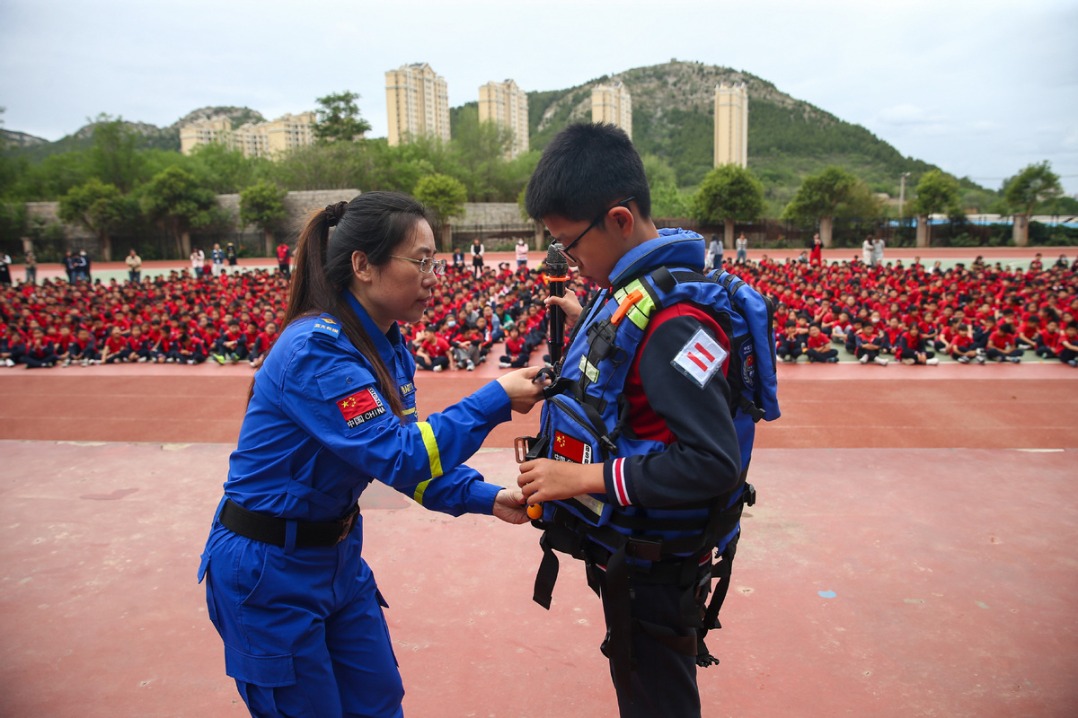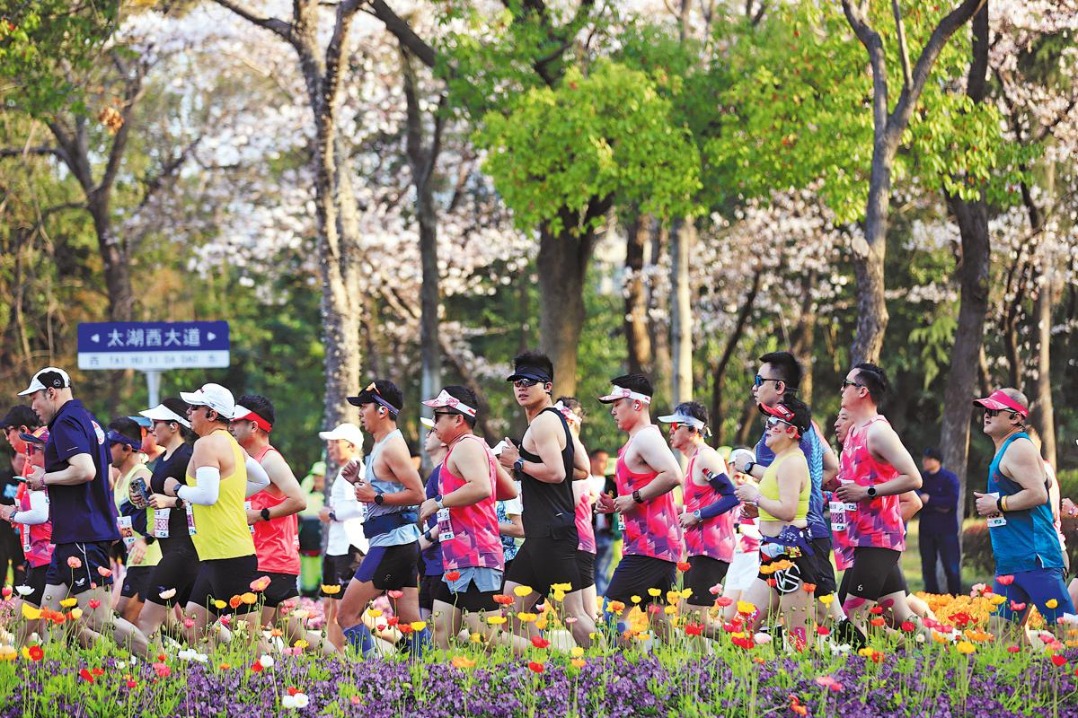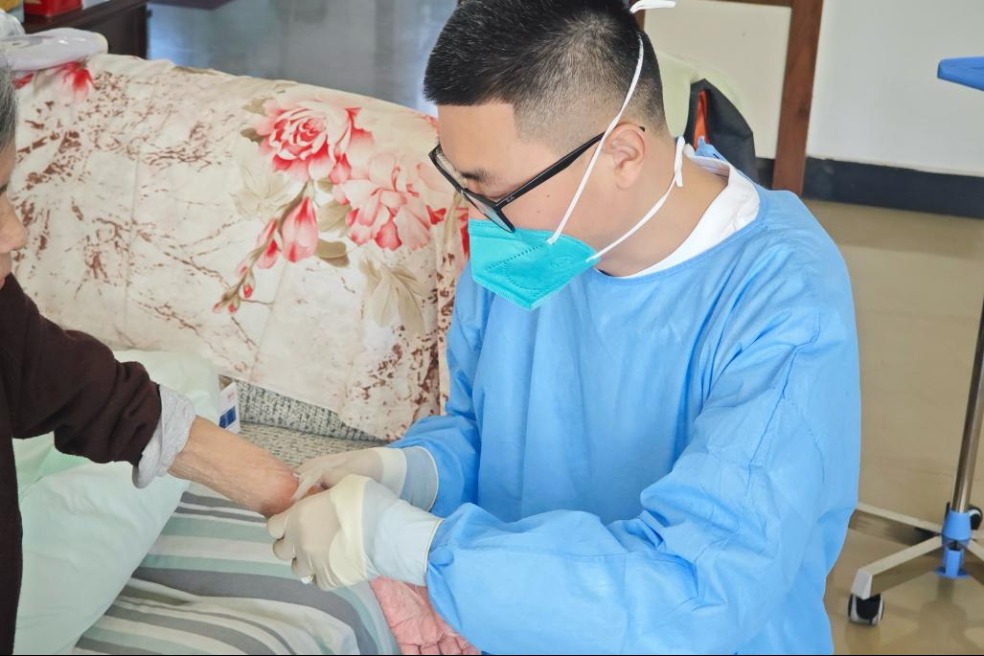From hospital to home, a Chinese nurse cares for elderly as for children

BEIJING -- At 7 am, Lang Zhizun starts his day behind the wheel, heading to neighborhoods in Beijing to deliver nursing care to those who need it most at their home bedside.
An elderly gentleman, unable to urinate for two days, eagerly awaited Lang's home visit. His wife had exhausted various attempts to help him before finally learning about the door-to-door nursing services.
After learning about his medical history, Lang, clad in protective suits and wearing disposable gloves and shoe covers, proficiently inserted a urinary catheter for the old man, a decorated navy veteran. The drained urine amounted to 1,000 milliliters, almost doubling the largest volume one can bear under normal circumstances.
What struck Lang most was the veteran's stoicism. Unlike many patients who groan or resist during the uncomfortable procedure, the elderly man remained silent, not even flinching.
Lang, 31, was formerly a male nurse at a top-tier children's hospital in Beijing. In 2019, he quit his stable job and opened a nursing station, diving into home-based medical and nursing services. Most of his customers are bedridden seniors, partially or completely dependent on others.
Over the years, Lang had served more than 5,000 elderly individuals, assisting with wound dressings, bedsores, and even defecation. The work has taught him one thing: everyone is equal before senescence, and what he can do is to try his best to soothe their pain, both physically and mentally.
FROM PEDIATRIC CARE TO GERIATRIC COMPASSION
After graduation, Lang worked in the pediatric surgery ward of the hospital, escorting children, some as fragile as premature infants, to and from operations. The gratitude in their parents' eyes kept him going.
Things changed following his bold decision. "Children are very resilient, and they always get better and better," Lang said. In contrast, elderly people are "in a steady decline," evoking sorrow and heaviness.
However, his career pivot was not impulsive. In 2019, Lang's grandfather passed away after a grueling 10-day bedridden struggle. Having watched his family scramble between home and hospital, Lang realized the toll elderly care takes, and worried about his own parents' future. As an only child, he knew his hospital job wouldn't allow him to support them properly. So he took a leap of faith into home nursing.
The transition did not always go smoothly. Once, he was called to replace a catheter for an elderly man, only to discover it hadn't been changed in three months, which, in normal cases, should be changed every two to four weeks.
"When the catheter was removed, blood sprayed directly onto my gown," he recalled. The patient's family was frightened, and some cried, but Lang stayed calm, applying pressure until the bleeding stopped.
The nerve-racking experience served as a reminder for Lang to keep alert in any accidental situations. Since then, he has made it a protocol for the patients' families to sign consent forms acknowledging risks before any procedure.
SURGING DEMAND
Lang's shift to home care was also driven by a stark reality: More than 300 million people in China were aged 60 and above by the end of 2024, accounting for 22 percent of the total population, with 11.6 percent unable to care for themselves, statistics show.
Most seniors prefer aging at home, but community-based hospitals often lack the resources needed for urgent care, making at-home nursing services a necessary option.
Lang's seven-strong team is constantly fully booked, despite fees averaging 219 yuan (about $30.4) per visit -- higher than an outpatient medical cost.
He fielded nine urgent calls even on a heavily windy April day when most stayed indoors.
One came from 82-year-old Li Zhongshi (pseudonym). Li was diagnosed with prostate cancer seven years ago and received radiotherapy afterward. A recent small surgery limited Li to bed, making it challenging to get to the hospital for the cancer sequelae.
"We have to spend one and a half hours to go to the hospital by taxi," Li said. "By the time I see a doctor, the whole day is gone."
In order not to "cause trouble" for his children and due to the inaccessibility of on-site medical services by the community-based hospital, Li placed the order, asking Lang to come.
Li's story is far from an isolated incident in China. The aging population has severely strained home-based elderly care, triggering increasing demands for at-home care services.
China launched an "Internet Plus Nursing Service" initiative in 2019 and piloted it in six major provincial-level regions, including Beijing, Guangdong and Zhejiang. The program was later expanded nationwide.
In addition to full-time on-demand nurses like Lang, more nurses have been mobilized by public hospitals to pitch in and provide nursing services in homes during their off hours. As of mid-2024, more than 3,000 medical institutions in China offered over 60 types of on-demand services, from wound dressing and post-op recovery to mental health support.
"Home care means delivering professional medical resources to every household that requires them," Lang said.
BEYOND MEDICAL CARE, EMOTIONAL LIFELINES
Having knocked on thousands of doors of the elderly, Lang has built a reputation among his clientele with his expertise and empathy.
Whenever the one in the bed frowns, groans, and moans, Lang would lean in closer, gently stroking his or her hand and offering words of comfort, much like one would comfort a child.
Lang fully understands that emotional value matters equally to medical care for those he cares for. "Both the elderly and their family members long for warmth."
He shared some of his on-site caregiving experiences on Douyin, the Chinese version of TikTok. One viral video clip showing a 70-something woman who is eager to share her experiences of taking care of her bedridden husband was deeply resonated with many viewers.
"This grandma must be lonely. Cannot imagine how my parents would get through if I was not with them," commented one viewer.
For many empty-nesters, Lang is both nurse and confidant. "As long as time permits, I'm willing to chat with them for a while," he said.
Through videos, he also shares caregiving tips, hoping every elder, rich or poor, can age decently. "Our mission," Lang said, "is to ensure that every bedridden senior lives each day as comfortably as possible. That's the greatest dignity we can give them."
- From hospital to home, a Chinese nurse cares for elderly as for children
- China and global talents converge at AI cross-cultural conference in Xinxiang
- China purchases 345m tons of autumn grain
- Shanghai University celebrates diversity at intl cultural festival
- Seven Chinese nurses awarded Florence Nightingale Medal
- Abstract of white paper on China's national security in new era





































